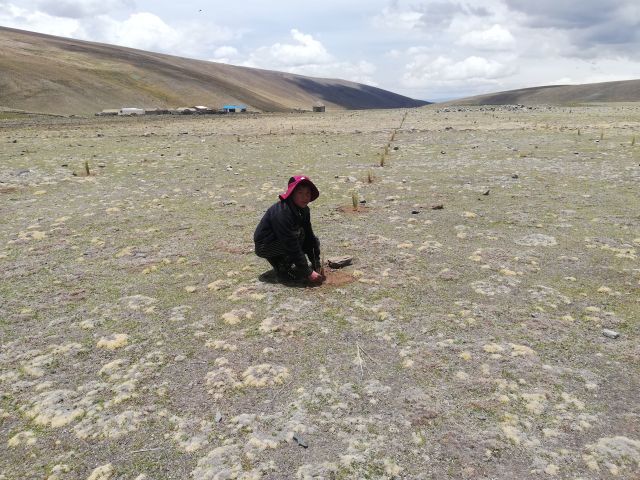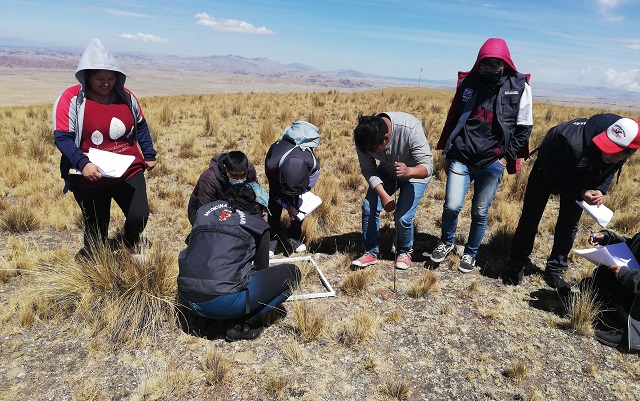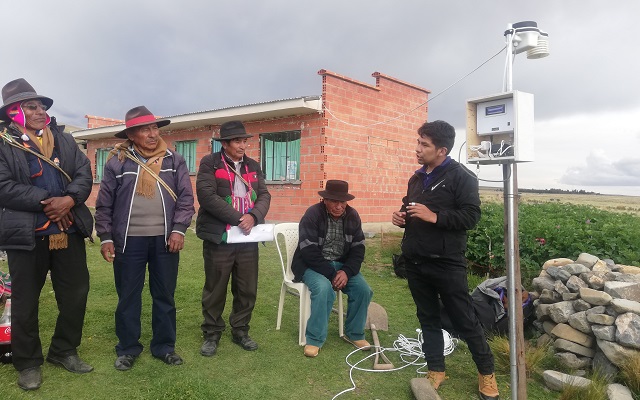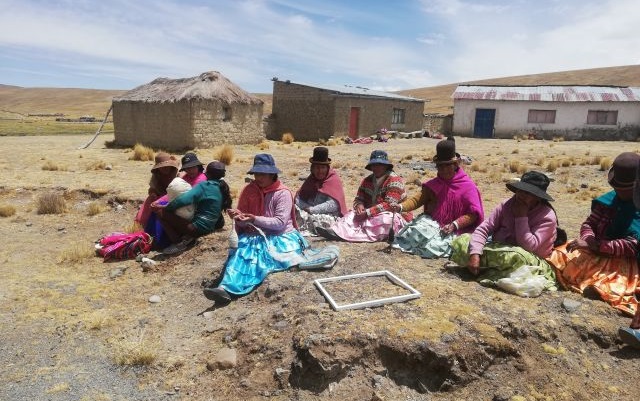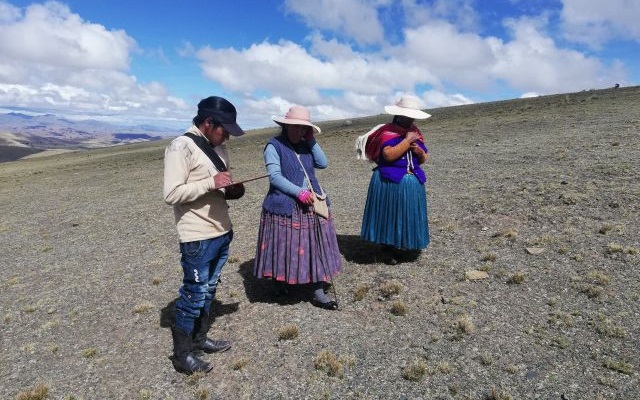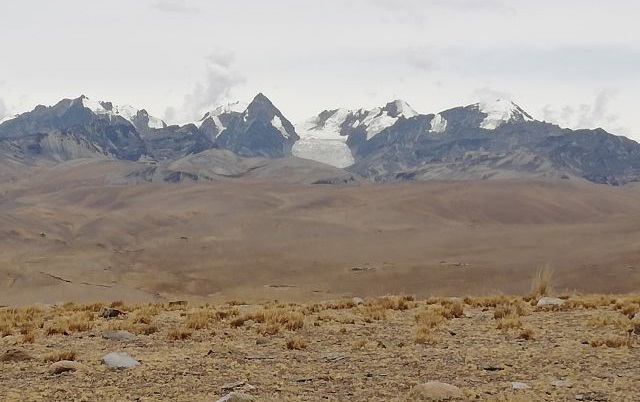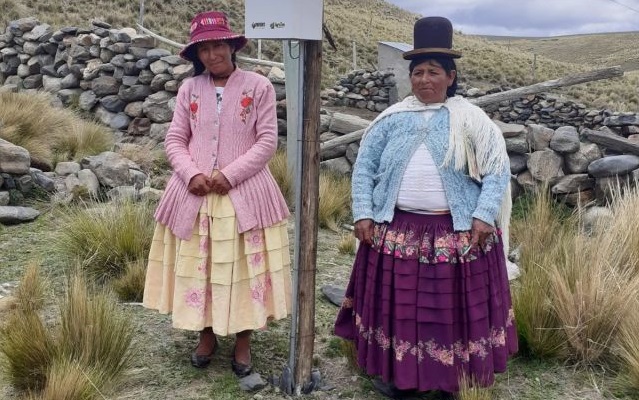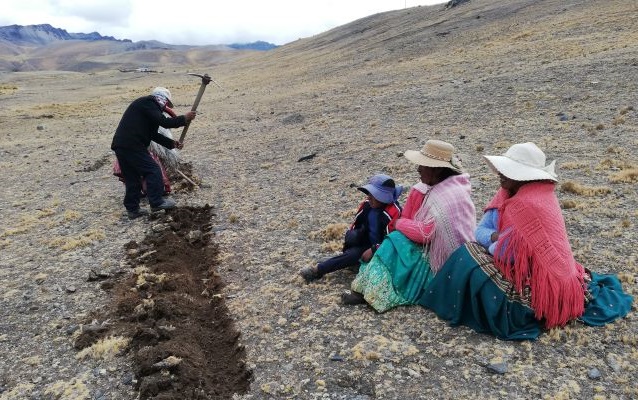Holistic management for recovery of degraded soils in Bolivian grazing grasslands
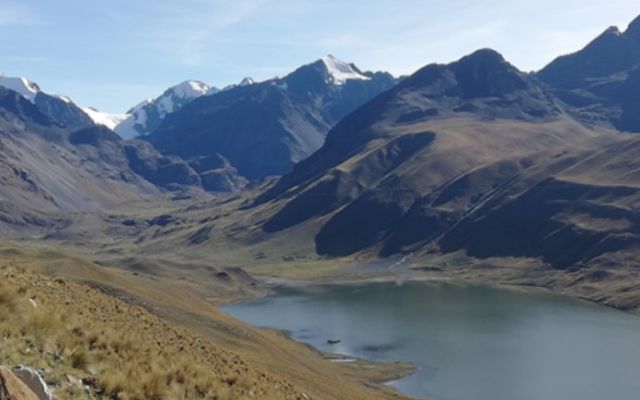
In the Bolivian altiplano there are thousands of hectares of degraded grasslands with more than 50 per cent bare soils, mainly caused by poor grazing management. These areas can be rehabilitated to improve their ability to capture carbon from the atmosphere and to contribute to mitigation and adaptation to the effects of climate change. The project aims to improve the livelihoods of camelid producers with holistic agroecological practices and climate change adaptation plans that mitigate the effects and improve carbon sequestration in native grasslands, recover degraded soils, create denser vegetation cover and increase the income of local farmers. In addition, there is a participatory monitoring plan for the effects of climate change adaptation practices on natural resources, as well as for raising awareness among local producers on how to manage climate risks appropriately.
INITIAL SITUATION
The municipality of Batallas is located in the northern part of the Bolivian altiplano, where climatic adversities (droughts, frost, hail), soil erosion and the level of poverty (96% in rural areas) limit agricultural production.
The production of camelids is the main source of economic income for local farmers. They use traditional practices and organize themselves into associations to access services, such as: agricultural machinery, animal health services, use of infrastructure for slaughtering and transportation of products. The average land owned by a family is 30 hectares. The objective of the project is to work with 85 families in three communities and cover 800 hectares of grasslands used for livestock production and small-scale crop cultivation. The main challenge is the inadequate management of the grasslands which, together with the adverse climatical changes (less rains and more winds), are favouring soil degradation, biodiversity loss and the vulnerability of the agricultural productive system. Degraded areas with a vegetation cover of 50% have been observed to produce only low quality fodder for livestock.
TARGET GROUP
The target group of the project consists of 85 small-scale producers, Aymara men and women, who live from the production of camelids and traditional agriculture. Each family has on average 50 llamas, 20 sheep and 2 cattle and they grow Andean tubers (potato, oca, isaño and papaliza). The local population has a low level of education, and limited access to economic resources and technological innovations. They know their context very well and use ancestral practices that are not working well under CC-conditions, with irregular rains, longer droughts, loss of biodiversity and increasing diseases in livestock.
Therefore, local farmers show interest in new agricultural practices that are friendly to the environment, better adapt to the effects of CC, improve their production and secure their livelihoods. Local producers will participate in the entire project cycle – from the design, implementation and monitoring to the final evaluation. The project aims to generate a change in the attitude of local producers towards CC. It will strengthen their capacities in the sustainable management of natural resources and promote environmental management approaches and greater participation of families with gender equality (adults and young people).
APPROACH AND ACTIVITIES
All project activities are aiming to promote a greater participation of local producer families.
Throughout the project implementation, participation with gender equality is sought, where men and women have the same opportunity to train and acquire technical knowledge to create greater awareness and resilience regarding the threats of climate change in a fragile ecosystem such as the Bolivian altiplano. The methodology used is very participatory from the planning to the monitoring and evaluation of the project (self-assessment).
A Holistic Management approach is used for the training, technical assistance and implementation of project measures. It is also promoting the involvement of farmers through the realization of contests to improve the management of natural resources (soil, water and plant cover) in the communities and to strengthen their resilience against climate change. The approach focuses on agroecological practices which are most suitable for the region, allowing a greater capture of carbon from the atmosphere in native grasslands and in the soil, which will be evaluated through the increase in plant cover, biodiversity and biomass.
LATEST PROJECT HIGHLIGHTS AND IMPACTS
- Project finalised
- Piloting of a method to determine and evaluate the CO2 storage capacity in pasture areas.
- Following a successful test, the methodology is to become a national standard procedure.
- Training and engagement of local residents and families in the implementation and monitoring of agroecological approaches
- Installation of two weather stations to establish a digital early warning system for users through Wi-Fi and messenger services.
CAPACITY DEVELOPMENT
To improve ADEMA’s capacities in the sustainable management of natural resources in the context of CC, the institution will receive specialized trainings for its experts in:
- Management of Geographic Information Systems (GIS) along with the acquisition of some basic equipment and software, to generate geographic and cartographic maps and information.
- Training in the handling of drones to generate information on grassland vegetation cover through three-dimensional maps that will be useful for planning and developing strategies for current and future projects.
- Training and updating of knowledge in tax regulations for the administrative/financial staff, taking into account that the tax system in Bolivia is currently being renewed.
ABOUT THE ORGANISATION
ADEMA is a national non-profit organization implementing projects without commercial interests. It contributes to the reduction of rural poverty and to the improvement of the food security of vulnerable sectors in Bolivia, based on innovative technological resources that allow the sustainable management of natural resources while conserving the environment.
Since 2005, ADEMA has been working in vulnerable regions of the Bolivian altiplano, developing projects to strengthen the capacities of local producers in conserving the environment, based on better management of natural resources (soil, water and vegetation cover), the recovery and conservation of native biodiversity through the establishment of various agroecological practices adapted to the socioeconomic context of the region. It has also developed projects on sustainable management of Andean livestock.

